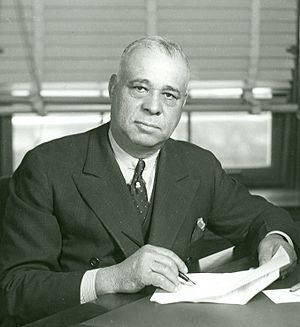Arthur Wergs Mitchell facts for kids
Quick facts for kids
Arthur W. Mitchell
|
|
|---|---|
 |
|
| Member of the U.S. House of Representatives from Illinois's 1st district |
|
| In office January 3, 1935 – January 3, 1943 |
|
| Preceded by | Oscar De Priest |
| Succeeded by | William Dawson |
| Personal details | |
| Born | December 22, 1883 Lafayette, Alabama |
| Died | May 9, 1968 (aged 84) Petersburg, Virginia |
| Political party | Republican (Until 1932) Democratic (After 1932) |
| Spouse | Eula Mae King (m. January 11, 1905 – d. 1910) 1 son
Annie H. Mitchell (married c. 1919 – d. March 7, 1947) Clara D. Smith (m. March 20, 1948 – his death May 9, 1968) |
| Profession | Lawyer, Farmer |
Arthur Wergs Mitchell, Sr. (born December 22, 1883 – died May 9, 1968) was an important American politician. He served as a U.S. Representative for Illinois. From 1935 to 1943, he was the only African American person in the United States Congress. Mitchell made history as the first African American to be elected to the United States Congress as a Democrat. He won against and took the place of Oscar De Priest, who was a Republican.
Contents
Arthur Mitchell's Early Life
Arthur Mitchell was born in Lafayette, Alabama. His parents were Taylor Mitchell and Emma Patterson. When he was 14, he left home to attend the Tuskegee Institute. While studying there, he worked on a farm and as an assistant to Booker T. Washington. Mitchell also briefly studied at Columbia University. He then became a lawyer.
After becoming a lawyer, Mitchell moved to Chicago, Illinois. He started working with the Republican Party. However, in 1932, he decided to switch to the Democratic Party. He felt this move would give him a better chance to advance his career. Mitchell was also a member of the Phi Beta Sigma fraternity. He served as its 6th International President from 1926 to 1934.
Mitchell's Political Career
In 1934, Arthur Mitchell was elected to the House of Representatives. He won against the African American congressman Oscar De Priest, who was a Republican. During his election campaign, Mitchell strongly supported the New Deal. This was a series of programs by President Franklin D. Roosevelt to help people during the Great Depression. Mitchell also criticized De Priest's approach to ending segregation.
Mitchell won the election with 53% of the votes. De Priest congratulated him, saying, "I congratulate you as [the] first Negro Democratic congressman."
Fighting for Civil Rights
In Congress, Mitchell worked hard to introduce new laws. He proposed bills to ban lynching, which was a terrible act of violence. He also worked against discrimination. One important case involved Mitchell himself. He filed a lawsuit against the Illinois Central and Rock Island Railroads. This happened after he was forced into a segregated train car. This car was for Black people only, just before the train entered Arkansas.
Mitchell's lawsuit went all the way to the U.S. Supreme Court. The case was called Mitchell v. United States. The Supreme Court decided that the railroad had broken the Interstate Commerce Act. This law was about fair treatment in transportation.
Mitchell chose not to run for re-election in 1942. As his last act in Congress, he spoke out against politicians. He felt some politicians seemed to prefer the Axis powers (enemies during World War II) over giving rights to Black people. He compared the terrible acts of the Nazis and Japanese to violence against Black people in America, like the lynchings that had happened in Shubuta, Mississippi.
Even though Mitchell fought for civil rights, some people felt he didn't do enough. For example, the National Association for the Advancement of Colored People (NAACP) thought his proposed anti-lynching bill was not strong enough.
Life After Congress
After leaving Congress, Arthur Mitchell moved to Virginia. He became a farmer and worked on a twelve-acre property. He passed away at his home in Petersburg, Virginia, on May 9, 1968.
See also
- List of African-American firsts
- List of African-American United States representatives
- List of Phi Beta Sigma brothers
External sources
- O'Connor, Allison (November 14, 2007). Arthur Wergs Mitchell (1883–1968). BlackPast.

